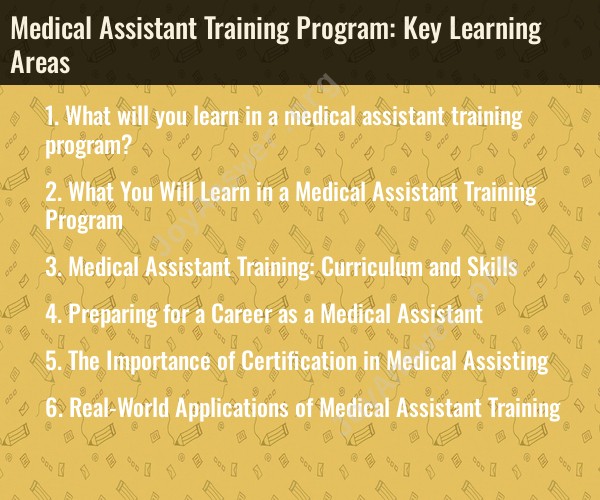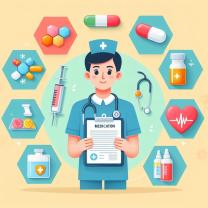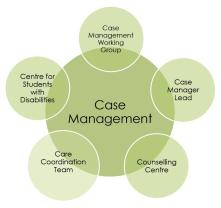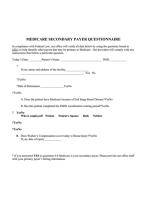What will you learn in a medical assistant training program?
Medical assistant training programs are designed to prepare individuals for a career in healthcare by teaching a combination of clinical and administrative skills. These programs typically cover a range of key learning areas, providing students with the knowledge and practical skills needed to assist healthcare professionals in various medical settings. Here are the key learning areas typically covered in a medical assistant training program:
Anatomy and Physiology: Understanding the structure and function of the human body is fundamental for medical assistants. Students learn about the major systems and organs in the body.
Medical Terminology: Medical assistants need to be proficient in the language of healthcare to communicate effectively with both patients and other healthcare professionals.
Medical Office Procedures: This includes instruction on administrative tasks such as appointment scheduling, medical record management, and medical billing and coding.
Clinical Procedures: Students learn hands-on clinical skills, including taking patient histories, measuring vital signs (e.g., blood pressure, temperature), and preparing patients for exams.
Pharmacology: Understanding the basics of medications, including drug classifications and dosage calculations, is crucial for medical assistants.
Infection Control: Learning proper hygiene and safety measures to prevent the spread of infections in healthcare settings.
Patient Communication and Customer Service: Developing effective communication and interpersonal skills to interact with patients in a compassionate and professional manner.
Medical Laboratory Procedures: Instruction on collecting and processing specimens, performing basic laboratory tests, and handling medical equipment.
Electrocardiography (EKG): Training in conducting EKGs to monitor and record the electrical activity of the heart.
Phlebotomy: Learning how to draw blood for diagnostic testing while maintaining patient comfort and safety.
Medical Ethics and Legal Issues: Understanding healthcare laws, patient privacy (HIPAA), and ethical considerations in patient care.
Basic First Aid and CPR: Training in responding to medical emergencies and providing initial care to patients in distress.
Electronic Health Records (EHR): Familiarity with electronic health record systems and their use in modern medical practices.
Clinical Externship: Many medical assistant programs include a clinical externship where students gain practical experience in a healthcare facility under the supervision of a healthcare professional.
Professional Development: Preparing students for job interviews, resume writing, and professional conduct in a healthcare setting.
Medical assistant training programs can vary in duration and depth, with some offering certificate programs that last a few months, while others provide more comprehensive associate degree programs. The specific curriculum and focus of the program may also vary by institution. Upon completion of the training program, individuals can pursue certification as a Certified Medical Assistant (CMA) or a Registered Medical Assistant (RMA) to enhance their job prospects and demonstrate their competence in the field.
What You Will Learn in a Medical Assistant Training Program
A medical assistant training program will teach you the skills and knowledge you need to work in a medical office. You will learn about:
- Anatomy and physiology: You will learn about the structure and function of the human body.
- Medical terminology: You will learn the medical terms used to describe body parts, diseases, and procedures.
- Clinical skills: You will learn how to perform clinical tasks, such as taking vital signs, administering injections, and drawing blood.
- Administrative skills: You will learn how to perform administrative tasks, such as scheduling appointments, billing and coding, and maintaining medical records.
Medical Assistant Training: Curriculum and Skills
The curriculum for a medical assistant training program will vary depending on the school. However, most programs will cover the following topics:
- Anatomy and physiology
- Medical terminology
- Clinical skills
- Administrative skills
- Medical law and ethics
- Communication skills
- Computer skills
In addition to classroom instruction, most medical assistant training programs will also include clinical rotations. This will give you the opportunity to practice your skills in a real-world setting.
Preparing for a Career as a Medical Assistant
To prepare for a career as a medical assistant, you will need to complete a medical assistant training program and obtain certification. There are a number of different medical assistant certification organizations, such as the National Center for Competency Testing (NCCT) and the American Medical Technologists (AMT).
Once you are certified, you can start looking for jobs as a medical assistant. Medical assistants typically work in doctors' offices, hospitals, and other healthcare facilities.
The Importance of Certification in Medical Assisting
Certification is important for medical assistants because it demonstrates that you have the skills and knowledge necessary to perform the job. Certification can also make you more competitive in the job market and may lead to higher pay.
Real-World Applications of Medical Assistant Training
Medical assistants play an important role in the healthcare system. They provide a variety of administrative and clinical services to patients and physicians.
Here are some examples of the real-world applications of medical assistant training:
- Taking patients' vital signs
- Administering injections
- Drawing blood
- Scheduling appointments
- Billing and coding
- Maintaining medical records
- Preparing patients for exams and procedures
- Assisting physicians with exams and procedures
- Educating patients about their health condition
Medical assistants play a vital role in the healthcare system and help to ensure that patients receive quality care.













